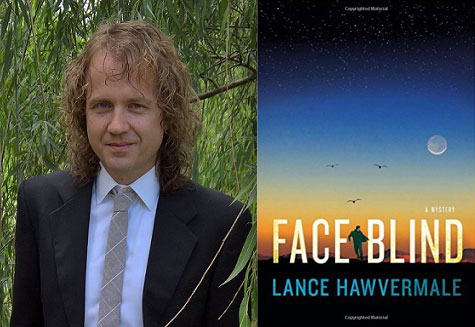
Could you even imagine living with a brain disorder that affected your ability to recognize faces from one another? It's called “prosopagnosia,” and it's as scary as it is hard to say.
Lance Hawvermale drew on this disorder as inspiration for his upcoming thriller, Face Blind. Lance was kind enough to take some time out of his busy schedule to talk with CrimeHQ about prosopagnosia, the Atacama Desert, astrology, and more!
Your main character, Gabe Traylin, has a neurological disorder that leaves him face blind—unable to distinguish one person's face from the next. How did you come up with this idea, and how does Gabe attempt to live with this disability?
I’ve always been drawn to weird things. If it’s out of place, quirky, or even macabre, you can bet I’m hovering somewhere nearby. Gabe’s condition is called “prosopagnosia,” and it defines his life. He witnesses a murder but is unable to provide the police with a description of the killer, and so he becomes a suspect himself. For years he’s lived with his handicap by running away from it. But, one day he realizes he can’t run any farther because he’s reached the emptiest place on earth.
You've previously published novels under the pseudonym Erin O'Rourke. What made you bust out your real name for Face Blind?
I had to become a woman to get published. My first novel, Seeing Pink, was targeted at a female readership, so my editor insisted that we use a woman’s penname. Writers must be quick-change artists, always ready to shift form in order to tell the stories inside of us. The Erin O’Rourke side of me writes about social issues and our need for reform; the Lance Hawvermale side of me is more concerned with the velocity of a bullet and how long a man can survive in the desert without water.
Face Blind is set in Chile's Atacama Desert. Have you ever traveled there? Why did you choose to set your novel in a place where rain hasn't fallen in 400 years?
In many ways, Face Blind is a novel of desolation. A place where no living things can be found is the perfect headquarters for a man who cannot recognize human faces. Gabe is the ultimate outcast. He feels most at home in a land so alien that even mosquitos don’t live there. I have never been to the Atacama, but I knew I had to find the most appropriate metaphor for Gabe’s discomfort. It was either the Atacama or the Antarctic—and I don’t like the cold.
If you could have any detective, real or fictional, to help out Gabe, who would you choose and why?
My favorite fictional detective has always been Magnum, P.I., though he’s not very well equipped to handle Gabe’s situation. Charming, yes. Vindictive, no. And, Gabe needs someone hardcore at his side because the forces he’s up against are too gruesome for a man in a Hawaiian shirt—handsome though he may be. Gabe would be better served with Al Pacino’s version of Frank Serpico.
What was the hardest part about writing Face Blind?
Gabe explores the barbarism of a real-world dictator, one who was brought to power by our own government. The horrors inflicted on the innocent of this world continue to stun me. Why do we permit people in power to commit these acts—even to this day? Writing this novel made me realize that we’re repeating our own bloody history, one generation after the next. We’re just too complacent to do anything about it.
What’s your favorite line from Face Blind and why?
I won’t mention my favorite line because that’s a major plot spoiler. But, here’s one that sums up Gabe’s thoughts during his struggle:
“Nobody had guts of mythic level anymore; nobody went hunting for the big game.”
Gabe works as an astronomer. Is this a reflection of your own hobbies or passions?
My wife is an amateur astronomer, and her love of the stars has infected me. Astronomy was the only profession for Gabe because that space between the stars is symbolic of his condition. He can’t discern one human face from another, so he feels safer when gazing up at the light from ancient suns. The night sky makes sense to him in a way that humanity does not.
What do you want readers to think or feel after finishing this book?
Gabe ends up partnering with three misfits, and they realize that none of them are as alone as they first assumed. There is power in unity, and hopefully the readers feel that way when they close the book. Due to his condition, Gabe has always been a natural loner, but he must welcome others into a kind of shared solitude if any of them are to survive. We should all be so wise as to break down the barriers we build around ourselves.
What are you currently binging on Netflix?
I just completed Jessica Jones, a gritty angle on the superhero story, with a protagonist who is the noir-ish equal of any male lead. All the clichés are there: drinking, loveless romances, and haunted pasts. Jessica is so hardboiled that I almost forget she’s a superhero, sans the cape.
See also: Binge-Worthy: Jessica Jones Review—Season 1, Episodes 1-4
To learn more or order a copy, visit:
Lance Hawvermale, author of Face Blind, holds a master's degree in English and has worked as a college professor, an editor, and a youth counselor. His fiction and poetry have garnered numerous awards. An alumnus of the AmeriCorps program, Lance performed his service on the Otoe-Missouria tribal lands in Red Rock, Oklahoma. He lives in Texas with his wife and daughter and their cats.
